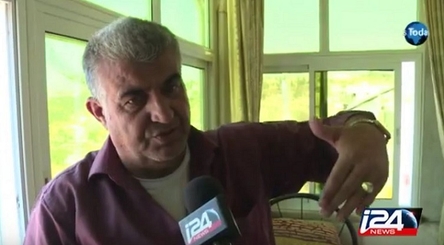UPDATES
Hay in needle-stacks: A Hero in Hebron
September 16, 2015 | Ari Wenig

Coming across something rare is often analogised as finding “a needle in a haystack”. And yet, this simile reflects the Israeli-Palestinian divide far more aptly when reversed. Finding acts of pure humanity in and amongst this deeply polarised, and often manic conflict, tends to be like searching for hay in a stack of needles; disheartening, dangerous.
Last week, however, saw a heroic glimpse of said humanity when a Palestinian resident of Hebron, Faiz Abu Hamadiah sheltered five American Jews from fire bomb attacks carried out by an angry lynch mob in Hebron. The five Americans were Yeshiva students, who took a wrong turn on their way to the Cave of Patriarchs (Ma’arat Hamachpelah), only to have their car attacked with rocks and fire bombs by Palestinian assailants. According to witness reports, the riots would surely have ended fatally but for Hamadiah and his family, who briskly swept the students into their home, providing them with water and shelter until the arrival of the Israeli troops almost an hour later.
When recalling the event to Israel’s Ynet news website, Hamadiah told interviewers “I’m not a hero…This is my world view…either you are human, or you don’t do it, and you aren’t.” The 51 year-old husband and father was willing to use the machete that he keeps by his door in order to defend the students, explaining that he would do so “even if it risked [his] life and the life of [his] children.”
Sadly, Hamadiah’s heroism has been met with vicious disdain and accusations of betrayal from his people, with him and his family receiving threats that his house will be “burnt down” or his head “cut off”, as he revealed to a Channel 2 reporter. Hamadiah maintains that protecting the boys was “the right thing to do”, and yet, the reaction of his people illuminates a deep-rooted, philosophical needle that has penetrated the fabric of a society.
Here in Australia, as in most parts of the Western world, there is a moral expectation that heroism will be actively commended. The active denunciation of Hamadiah’s ethical valour represents a culture and an ideology whose moral compass has been distorted. The unfortunate truth highlighted by Jeff Jacoby of the Boston Globe, that “no society…has ever wholly uprooted the lust to…terrorize”, rings true. However, the “lust to kill”, as Jacoby puts it, is distinct from the failure to recognise an act of good – the former is primal, animalistic; the latter reflects a paradigm no longer in tune with humanity.
Jacoby writes that this story, in the ancient city of Hebron, is a “lesson in humanity”; “a heart-lifting reminder of the goodness that people are capable of, however poisonous the atmosphere that surrounds them.” And it is true to say that when our shared humanity is recognised, and the vernacular associated with the conflict shifts from ‘they are all the same’ to ‘we are all the same’, perhaps that humanity will be less obscured. But acts of terrorism, from both sides of the conflict, are often defended with the mantra that peoples should not be judged on the actions of an individual. So if the “goodness” of Faiz Abu Hamadiah is not widely respected by other Palestinians, then the question is simple: when will Israel have a sincere partner for peace?
Ari Wenig
Tags: Israel





